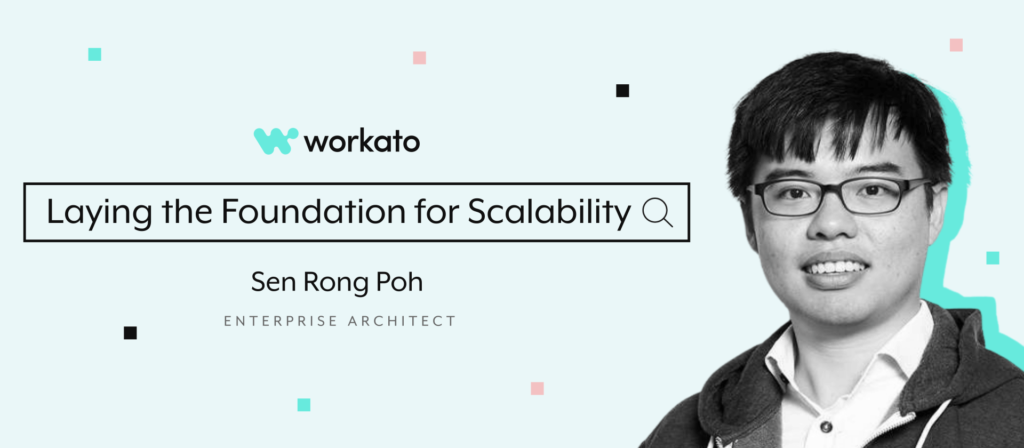Meet Sen Rong Poh—our 7th employee in Singapore and 36th globally.
Sen Rong has been an agent of change for Workato’s Business Technology team, where he’s laid the foundation for Workato’s work processes and systems.
But his career path isn’t what you might expect: He first joined Workato as a customer success intern, and then directly went on to build the company’s internal IT architecture, without prior knowledge or experience in programming and coding.
We interviewed Sen Rong to learn more about his unique and successful experience here at Workato. You can read on to see what he shared!
1. How did you begin your journey at Workato?
I started out as a customer success intern, serving the US market. At that time, I was a recent business graduate.
Shortly after I joined the company, Vijay, our CEO, wanted to create company dashboards for data visualization. I thought it would be fun to try something new, so I jumped on that opportunity. Working alongside Allan, our Managing Director in the APJ region, we hooked up our first systems—Salesforce and Intercom—to build Workato’s first automation workflow.
Albeit challenging, I found that I really enjoyed the process of building workflows from scratch. It was also great to experience first-hand how Workato’s suite of integration products empowers business users to create their own workflows easily.
Building the company dashboards was truly the beginning of my journey as part of the Business Technology team. Workato offered me a full-time role soon after and the rest, as they say, is history.
2. What was your experience like as an early employee of Workato?
Witnessing the company’s growth over the years has been eye opening.
In the beginning, all of us wore multiple hats—we did everything from talking to customers to closing deals. The Singapore team was pretty small back then and close-knit. We would eat supper and breakfast together, have game nights and drinks on Fridays, and even have special breakfasts on Saturday mornings!
I also had the opportunity to work from our US office. It was a small space with a big board-room table, where everyone had lunches together on Mondays, Wednesdays and Fridays. We spent countless nights working on demos to present during conferences, or just simply watching Netflix together.
As the company grew, our roles became more specialized, and we needed to redefine our processes in order to scale Workato’s operations. That was when I started to think about how to bring our sales leads from multiple sources into our CRM system, and how to create dashboard reports for our board meetings. As we started to onboard more people, I started automating some of my work too, and these workflows gradually scaled alongside the company’s growth.
3. What surprised you about working at Workato?
Workato truly supports employee growth and strives to ensure that our interests and skill sets are aligned. The company facilitates cross-functional transfers, so if I saw myself thriving in a marketing role, for example, Workato would do what they could to make the transfer. And if I had strengths that would better suit another role that isn’t currently available, the company would look at creating a new role that caters to those skill sets. Of course, all of this depends on the needs of the business, but based on my experience, Workato will always try its best to support employees’ career aspirations.
4. Can you tell us about your career progression at Workato?
In my six years here, I’ve moved on from being an individual contributor to being a team leader of 13 people. I’ve also grown and developed both hard and soft skills thanks, in part, to the trainings and classes Workato sent me to. I now have three Salesforce certifications under my belt, and have knowledge on how to lead and give effective feedback to others.
Last but not least, I was given the opportunity to recruit my bosses (our CIO and my immediate boss). I’ve never heard of anyone having a say in hiring their bosses before, but this opportunity allowed me to find people who would fit into the team and the company. More importantly, it reinforced the notion that everyone’s opinion matters and is valued by the company.
5. Now that you are into your 6th year, what are some highlights of your career?
I’ve been able to play a leading role in building industry-leading automations, such as Lead Bot, which allows our sales teams to receive leads in real-time via Slack.
At a higher level, I’m proud of being able to help build a company that believes in empowering its people. Throughout my career here, I’ve had the trust of my leaders and peers to build our IT architecture and policies, even when I was only fresh out of university with little to no experience. Now, we’ve laid the groundwork for empowering business users to build and manage their own automation workflows, and put in place policies, training, and technology guardrails to help guide them through the process.
6. What advice would you give to recent graduates?
Even though it’s common to zone in on companies with big brand names, I would encourage recent graduates to expand their job search and consider smaller companies with growth potential too. Suppose it is a fast-growing company whose product you believe in and can vouch for—in that case, it could be a good place to power your career growth, as you get to do more and can make a significant impact on the company.

Want to join our team?
You can discover the roles we’re hiring for by visiting our careers page.

